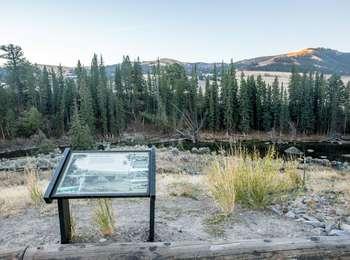Last updated: March 22, 2021
Place
Lamar River Bridge

Historical/Interpretive Information/Exhibits
At first, travel to and within the park was difficult. Visitors had to transport themselves or pay a costly transportation company.
In the park, there were only a few places for food and lodging. Access improved in 1883 when the Northern Pacific Railroad reached Cinnabar, Montana, a town near the North Entrance.
Wagons to Automobiles
After checking into the hotel, they toured the hot springs. For the next four days, they bounced along in passenger coaches called “Yellowstone wagons,” which had to be unloaded at steep grades. Each night visitors enjoyed a warm bed and a lavish meal at a grand hotel.
These visitors carried home unforgettable memories of experiences and sights, and they wrote hundreds of accounts of their trips. They recommended the tour to their friends, and each year more came to Yellowstone to see its wonders.
When the first automobile entered in 1915, Yellowstone truly became a national park, accessible to anyone who could afford a car.
Expect Travel Hazards and Delays
- Drive cautiously and defensively.
- Allow time for road congestion.
- Do not stop on or block a road.
- Use pullouts; stay in your car to watch animals.
You are responsible for your safety.
Think Safety, Act Safely. Yellowstone is a Dangerous Place.
